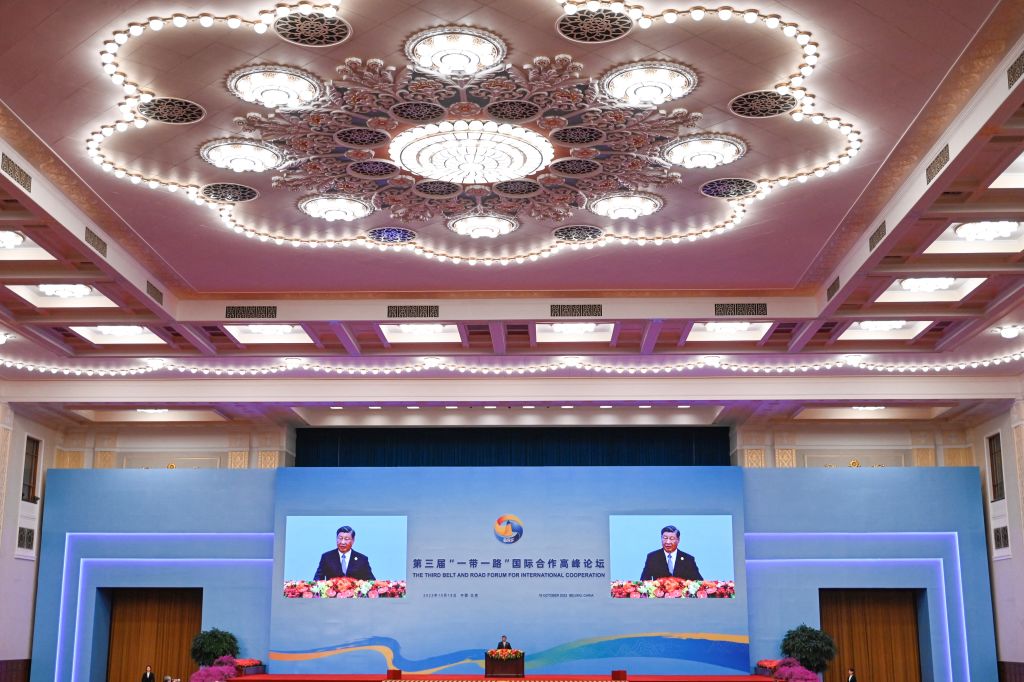
With all that’s going on in the world, you could be forgiven for missing that the 10th anniversary forum of Xi Jinping’s flagship foreign policy and trade program, the Belt and Road Initiative (BRI), was held in Beijing in the middle of last week. Some saw the West’s involvement in conflicts in the Middle East and Ukraine as creating a strategic opening for Chinese diplomacy at the forum. But that’s a misreading of China’s public diplomacy goals and a far too rosy view of how last week’s event actually went.
China wants the world to value the BRI and to view China as a legitimate leader of nations in global development. As an initiative that Xi himself proposed in 2013, its success is directly linked to his power as a leader.
Beijing saw this forum as a crucial chance to advocate for its ‘global community of shared future’ proposal. In the run-up, it released a white paper outlining how this proposal could lead to a new type of international relations that rejects the Western-led multilateral order and its emphasis on ‘universal values’. It also published a white paper on the BRI, positioning it as a core pillar of the ‘global community of shared future’ proposal. Xi’s keynote address at the conference focused on lauding the achievements of the first 10 years of the BRI and how following China’s development path through the ‘global community of shared future’ was the best way towards world peace and prosperity.
This message fell on deaf ears. Chinese state media reported that representatives from more than 140 countries attended the event, but, in fact, only 21 countries sent representatives at the head-of-state level. That’s the lowest ever attendance of heads of state at a BRI forum. Notably, the leaders of Brazil, India and South Africa—which, along with Russia and China, comprise BRICS—were absent.
In a telling contrast, Fiji’s Prime Minister Sitiveni Rabuka chose to make a state visit to Australia last week rather than attend the forum, sending his deputy to China instead. No bilateral BRI projects between China and Fiji were announced at the forum, whereas Australia announced a new pathway to permanent residency for citizens of the Pacific island countries and Timor-Leste. This is something China would never be able to offer the Pacific and addresses a genuine policy want from countries in the region.
China also made a public diplomacy blunder in giving Russian President Vladmir Putin top billing at the forum. Putin appeared next to Xi in the leader’s photo and was given the most important position after Xi as a keynote speaker. While we should worry about the strengthening Sino-Russian ‘no limits’ partnership, Russia isn’t even formally part of the BRI. Rather than emphasising strength and unity, giving Putin such a prominent role instead undercut China’s claims to multilateralism and anti-hegemony. That’s not to mention the image problems China has from its support of another rogue actor, the Taliban, who were invited to attend the forum and have been encouraged to join the BRI.
Many countries may have sent representatives to the forum as a way to maintain good relations with China, but not to further deepen their engagement with the BRI. With many Chinese development banks and financing institutions in attendance, countries with large BRI projects may have also used it as an opportunity to negotiate their existing financial agreements with China, rather than sign on to new deals. Indeed, Sri Lanka, which owes Chinese lenders more than US$7 billion, had its president advocating that a lack of debt relief for low-income countries posed an existential risk to the BRI.
In analysing where the BRI is going, we should look at what China does, not what it says. Major BRI projects are typically announced in an outcomes document from the forum, and an analysis of this year’s outcomes show a gap between what China says its new vision for the BRI is and what it is actually funding. Most projects in the list are not new deals and had already been announced prior to the forum. For example, the document announced that China would build the Solomon Islands’ national broadband network, although the deal was already signed more than a year ago. Similarly, China said it would construct the Kaduna–Kano railway in Nigeria, but ground was already broken on the project in mid-2021.
At the forum, Xi announced that ‘green development’ in the BRI would be a major step in the initiative, and early analysis has noted that the BRI will now be ‘smaller and greener’. While several renewable energy projects were announced, analysis of the outcomes document shows that the dominant type of project in the BRI still appears to be infrastructure, such as railways, ports, airports and sports stadiums. And as much as Xi’s speeches at the conference repeatedly emphasised his new focus on ‘high-quality’ Belt and Road cooperation, China will still have to manage a hefty legacy portfolio of large and not-so-high-quality projects like the Hambantota Port in Sri Lanka and the China–Pakistan Economic Corridor.
With close to US$1 trillion in funding granted over the years, the BRI remains a formidable tool of economic statecraft for China to pursue its foreign policy and security ambitions. But the poor attendance of world leaders at last week’s forum and the lack of international attention paid to it would be far from what Xi feels his initiative deserves.

